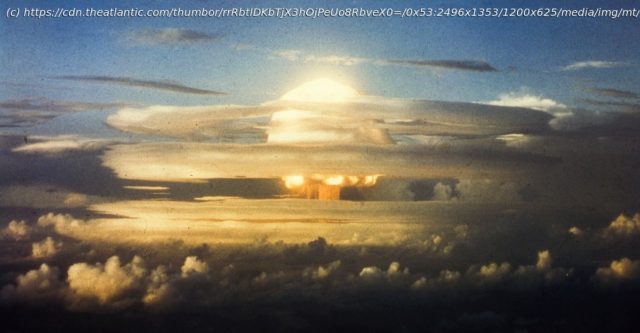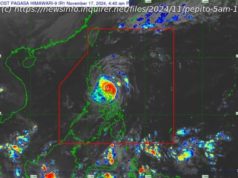Even a “minor” skirmish would wreck the planet.
When we talk about what causes climate change, we usually talk about oil and gas, coal and cars, and—just generally—energy policy. There’s a good reason for this. Burning fossil fuels releases carbon dioxide, which enters the atmosphere, warms the climate, and… you know the drill. The more fossil fuels you burn, the worse climate change gets. That’s why, a couple of years ago, I spent a lot of time covering the Trump administration’s attempt to weaken the country’s fuel-economy standards. It was an awful policy, one that would have led to more oil consumption for decades to come. If pressed, I would have said that it had a single-digit-percentage chance of creating an uninhabitable climate system. But energy is not the only domain that has a direct bearing on whether we have a livable climate or not. So does foreign policy—specifically, nuclear war. Since Russia invaded Ukraine two weeks ago, that threat has become a lot more real: Many Americans, including artists, climate-concerned progressives, and even a few lawmakers, have come out in support of a “no-fly zone.” But despite its euphemistic name, a no-fly zone means that NATO and the United States issue a credible threat that they will shoot down any enemy plane in Ukrainian territory. This would require U.S. bombing runs into Russian territory to eliminate air defenses, bringing the U.S. and Russia into open war, and it would have a reasonable chance of prompting a nuclear exchange. And it would be worse for the climate than any energy policy that Donald Trump ever proposed. I mean this quite literally. If you are worried about rapid, catastrophic changes to the planet’s climate, then you must be worried about nuclear war. That is because, on top of killing tens of millions of people, even a relatively “minor” exchange of nuclear weapons would wreck the planet’s climate in enormous and long-lasting ways. Consider a one-megaton nuke, reportedly the size of a warhead on a modern Russian intercontinental ballistic missile. (Warheads on U.S. ICBMs can be even larger.) A detonation of a bomb that size would, within about a four-mile radius, produce winds equal to those in a Category 5 hurricane, immediately flattening buildings, knocking down power lines, and triggering gas leaks. Anyone within seven miles of the detonation would suffer third-degree burns, the kind that sear and blister flesh.






